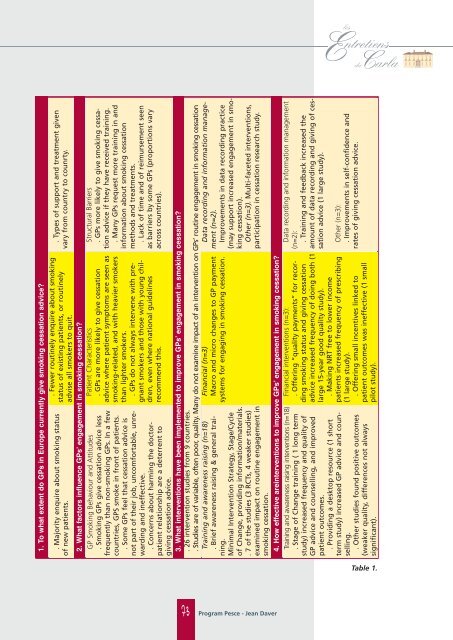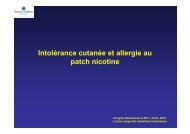Nicotine replacement therapy … - Carlos A ... - Entretiens du Carla
Nicotine replacement therapy … - Carlos A ... - Entretiens du Carla
Nicotine replacement therapy … - Carlos A ... - Entretiens du Carla
You also want an ePaper? Increase the reach of your titles
YUMPU automatically turns print PDFs into web optimized ePapers that Google loves.
1. To what extent do GPs in Europe currently give smoking cessation advice?<br />
. Fewer routinely enquire about smoking<br />
. Majority enquire about smoking status<br />
. Types of support and treatment given<br />
status of existing patients, or routinely<br />
of new patients.<br />
vary from country to counrty.<br />
advise all smokers to quit.<br />
2. What factors influence GPs’ engagement in smoking cessation?<br />
GP Smoking Behaviour and Attitudes Patient Characteristics<br />
Structural Barriers<br />
. Smoking GPs give cessation advice less . GPs are more likely to give cessation . GPs more likely to give smoking cessa-<br />
frequently than non-smoking GPs. In a few advice where patient symptoms are seen as tion advice if they have received training.<br />
countries, GPS smoke in front of patients. smoking-related, and with heavier smokers . Many GPs request more training in and<br />
. Some GPs feel that cessation advice is than lighter smokers.<br />
information about smoking cessation<br />
not part of their job, uncomfortable, unre- . GPs do not always intervene with pre- methods and treatments.<br />
warding and ineffective.<br />
gnant smokers and those with young chil- . Lack of time and of reimursement seen<br />
. Concerns about harming the doctordren, even where national guidelines as barriers by some GPs (proportions vary<br />
patient relationship are a deterrent to recommend this.<br />
across countries).<br />
giving cessation advice.<br />
3. What interventions have been implemented to improve GPs’ engagement in smoking cessation?<br />
. 26 intervention studies from 9 countries.<br />
. Studies are of variable, often poor, quality. Many do not examine impact of an intervention on GPs’ routine engagement in smoking cessation<br />
Training and awareness raising (n=18) Financial (n=3)<br />
Data recording and information manage-<br />
. Brief awareness raising & general trai- Macro and micro changes to GP payment ment (n=2).<br />
ning.<br />
systems for engaging in smoking cessation. Improvements in data recording practice<br />
Minimal Intervention Strategy, Stage/Cycle<br />
(may support increased engagement in smo-<br />
of Change, providing information/materials.<br />
king cessation).<br />
. 7 of the studies (3 RCTs, 4 weaker studies)<br />
Other (n=3). Multi-faceted interventions,<br />
examined impact on routine engagement in<br />
participation in cessation research study.<br />
smoking cessation.<br />
73 Program Pesce - Jean Daver<br />
Data recording and information management<br />
(n=2):<br />
. Training and feedback increased the<br />
amount of data recording and giving of cessation<br />
advice (1 large study).<br />
Other (n=3):<br />
. Improvements in self-confidence and<br />
rates of giving cessation advice.<br />
4. How effective areinterventions to improve GPs’ engagement in smoking cessation?<br />
Training and awareness raising interventions (n=18) Financial interventions (n=3):<br />
. Stage of Change training ( 1 long term . Offering “quality payments” for recor-<br />
study) increased frequency and quality of ding smoking status and giving cessation<br />
GP advice and counselling, and improved advice increased frequency of doing both (1<br />
patient outcomes.<br />
large 15-year good quality study).<br />
. Providing a desktop resource (1 short . Making NRT free to lower income<br />
term study) increased GP advice and coun- patients increased frequency of prescribing<br />
selling.<br />
(1 large study).<br />
. Other studies found positive outcomes . Offering small incentives linked to<br />
(weaker quality, differences not always patient outcomes was ineffective (1 small<br />
significant).<br />
pilot study).<br />
Table 1.






